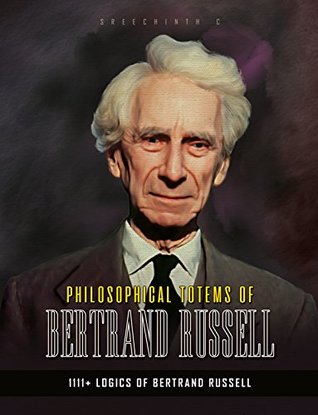Read Philosophical Totems of Bertrand Russell: 1111 Logics of Bertrand Russell - Sreechinth C | ePub
Related searches:
430 557 399 4783 294 1026 2123 321 3991 2693 1344 1703 671 1740 421 1977 1928 4254 1637 4098 795 427 4658 4157
Russell is generally credited with being one of the founders of analytic philosophy, but he also produced a body of work that covers logic, the philosophy of mathematics, metaphysics, ethics and epistemology.
Bertrand russell, british philosopher and logician, founding figure in the analytic movement in anglo-american philosophy, and recipient of the 1950 nobel.
Read 15 reviews this book describes russell's philosophical arguments published august 27th 1998 by totem books.
Although he was best known for his contributions to logic and philosophy, bertrand russell’s range of interests was impressively wide. He was engaged in what seemed to be the entire extent of human endeavor: not only was he deeply involved with mathematics, philosophy, science, and logic, but he was also interested in political activism, social justice, education, and sexual morality.
Satanism is a modern, largely non-theistic religion based on literary, artistic and philosophical interpretations of the central figure of evil.
100 philosophical quotes from bertrand russell by sofo archon here is a hand-picked collection of the greatest philosophical quotes from tthe renowned british philosopher, mathematician, historian, social critic, and political activist bertrand russell.
I can remember bertrand russell telling me of a horrible dream. A library assistant was going round the shelves carrying an enormous bucket, taking down books, glancing at them, restoring them to the shelves or dumping them into the bucket.
Abstract although numerous aspects of bertrand russell's philosophical views have been discussed, his views about the nature of the mind and the place of psychology within modern science have.
A prolific writer, bertrand russell was also a populariser of philosophy and a commentator on a large variety of topics, ranging from very serious issues to the mundane. Continuing a family tradition in political affairs, he was a prominent anti-war activist for most of his long life, championing free trade between nations and anti-imperialism.
Bertrand russell (1872-1970) was the greatest philosopher of the twentieth century and the greatest logician since aristotle.
Bertrand russell, british philosopher and logician, founding figure in the analytic movement in anglo-american philosophy, and recipient of the 1950 nobel prize for literature. His contributions to logic, epistemology, and the philosophy of mathematics made him one of the foremost philosophers of the 20th century.
We need to consider what is the value of philosophy and why it ought to be studied. It is the more necessary to consider this question, in view of the fact that many people, under the influence of science or of practical affairs, are inclined to doubt whether philosophy is anything better than innocent but useless trifling, hairsplitting.
Like many philosophical terms, “metaphysics” can be understood in a variety of ways, so any discussion of bertrand russell’s metaphysics must select from among the various possible ways of understanding the notion, for example, as the study of being qua being, the study of the first principles or grounds of being, the study of god, and so forth.
In this 1921 opus, wittgenstein defined the object of philosophy as the logical clarification of thoughts and proposed the solution to most philosophic problems by means of a critical method of linguistic analysis.
While there is significant evidence that russell did believe in the existence of simple entities in the early phases of his logical atomist period, it bertrandd possible that, uncharacteristically, he held this belief without argumentation.
Different, though related, versions of the view were developed by bertrand russell and ludwig wittgenstein. Russell’s logical atomism is set forth chiefly in his 1918 work “the philosophy of logical atomism” (russell 1956), wittgenstein’s in his tractatus logico-philosophicus of 1921 (wittgenstein 1981).
As ayer writes, “the popular conception of a philosopher as one who combines universal learning with the direction of human conduct was more nearly satisfied by bertrand russell than by any other philosopher of our time” (1972a, 127).
“bertrand russell used a man’s head of hair and asked whether the man was bald. Keep plucking and asking and eventually, after a hundred thousand plucks or so, the man passes from nonbald to bald. ” on intension and extension in introduction to mathematical philosophy by bertrand russell.

Post Your Comments: